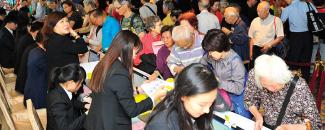Lucy Newcombe, Director, Global Corporate Communications, Computershare, reports on another busy and intriguing AGM season around the globe.
Hong Kong/China
Five years may seem like a relatively short period of time in the grand scheme of things, a mere blip in the centuries-old existence of Asian culture. Does a lot change in five years? It appears that in the local AGM world, it definitely does! I first wrote this feature in 2012, not long after having been seconded by Computershare to Hong Kong for a two-year stint. Since that first article, we've seen a remarkable change in several features of the Asian AGM.
Bucking the trend in several other countries around the globe (in Australia, attendance has declined 25% over the past five years), retail shareholders’ attendance at AGMs in Hong Kong has sky-rocketed:
- the percentage of meetings with more than 100 attendees has increased by 15.4%, and
- overall attendance at meetings has continued to climb – up by 99.4% from 2012.
Bank of China Ltd has held firm at the top of the attendance charts – the company had 2,308 guests at its AGM in 2012, the highest in Hong Kong; and set a new record with 5,053 attendees in 2016 – a phenomenal 119% increase over the five-year period. The top three attended AGMs were all in financial services this year:
- Bank of China Ltd (5,053 attendees)
- Industrial and Commercial Bank of China (4,981 attendees), and
- China Construction Bank Corporation (4,933 attendees).
So why is this happening? Over the period of a week, we asked shareholders visiting our counter in Wan Chai whether they attended AGMs and, if so, why. The top five reasons were
as follows.
- To ask questions about the running of the company. Shareholders feel that over recent years, retail investors have become more aware of their responsibilities and of the opportunity to ask questions and hear from management at AGMs.
- Due to them having spare time. Shareholders over 50 were far more likely to indicate that time was a reason for their attendance.
- To take advantage of the food/souvenirs/gifts provided by companies.
- Due to the AGM venue being conveniently located for them. Shareholders were far more likely to attend if a venue was close by or had easy transport links.
- Due to them holding a significant amount of shares in a particular company.
‘There is no denying that some retail shareholders see the gifts being handed out at meetings as a good dividend enhancement,’ says James Wong, CEO of Computershare in Asia. 'With the new Companies Ordinance now allowing more than two proxies, this means that shareholders can appoint more proxies and take more souvenirs, therefore generating a growing attendance at shareholder meetings. In addition to attending to collect souvenirs, shareholders are now paying more attention to the investee companies’ affairs, and institutional investors are now encouraged to get more actively engaged. It is getting increasingly important for companies to find out more about their investors’ profiles, and actively reach out to them to improve communication and understanding.’
The implications for companies
While it is not yet legal to hold a virtual AGM under Hong Kong's Companies Ordinance, with the increase in attendance showing no sign of slowing down, companies are going to be increasingly challenged to find a venue to cope with their requirements. There are a limited number of hotels and conference centres that can accommodate the logistics for an AGM – and with such a tight season, this is going to continue to be squeezed in coming years, forcing a hard look at whether virtual attendance will simply become necessary due to volume. On 27 May this year, there were at least 50 separate AGMs held in Hong Kong – each requiring a venue and logistics. The 7 June was even more challenging, however – while there were only 20 separate meetings, these included Bank of China and Hong Kong and China Gas – both meetings with very high turnout. Of course, the decision about how to get the ever popular souvenirs to virtual attendees will be one for discussion!
Additionally, the rise in attendees is inevitably increasing venue costs for companies.
Rejected resolutions
In addition to the rising attendance levels, shareholder dissent also appears to be on the rise in Hong Kong/China. A total of 31 resolutions were voted down at meetings in 2016 – with the number of failed resolutions continuing to rise, year on year.
The signals are being hung out high and clear for companies across Hong Kong and China – gone are the days when corporate secretaries had absolute certainty that their AGM would be nothing more than a pleasant discussion of what happened over the previous year with maybe some customer service issues or enquiries about energy prices constituting the bulk of the Q&As. Instead, we are in a time of people power, social media and shareholder activism, both at an institutional and retail shareholder level, with the result that important resolutions are being rejected.
Earlier this year, The Hong Kong Institute of Chartered Secretaries issued its research report
Shareholder Communications for Listed Issuers – Five Imperatives to Break the Monologue (available on the Institute's website:
www.hkics.org.hk), which focuses on five things companies can do to engage with institutional investors. Judging by the trends over the past five years, the core advice from this report is very timely:
- develop an investor relations strategy within the corporate strategy
- know and regularly review the shareholder base
- formulate and regularly review shareholder communications policies
- formulate and regularly review shareholder engagement policies, and
- review the responsibility and accountability for investor relations.
‘Knowing the make-up of its shareholder base is the first step for a company to engage with its shareholders,’ says Ying-Ci, Managing Director of Business Development for Computershare across Asia. 'We have seen more companies starting to realise the importance of having a clear picture of their shareholder base and trying to maintain an ongoing dialogue with shareholders. Companies who devote more to shareholder engagement enjoy smoother shareholder communications and subsequently a more satisfactory meeting outcome.’
What's happening in other countries?
Around the globe, Computershare works on more than 6,000 AGMs each year. Of those meetings, the table below shows the total number of meetings we worked on in each country and whether, in general, shareholder attendance rose, fell, or stayed the same in comparison to the previous year.
In the UK, 2016 resulted in arguably the most contentious AGM season since the notorious 'Shareholder Spring’ of 2012. From shareholders physically cornering Sports Direct founder Mike Ashley, to BP and Smith and Nephew both having their remuneration reports rejected outright; it was a busy time.
12 FTSE 100 companies received less than 80% support on their remuneration reports, compared to only six during the 2015 AGM season. Additionally, two FTSE 100 companies received less than 80% support on their remuneration policies, compared to none during the 2015 AGM season. Among the 30 biggest listed companies, the proportion that secured at least 95% shareholder backing across all resolutions halved in 2016, to 26%, compared with 52% in 2015.
In the FTSE 250, four companies (Weir Group, SVG Capital, Renewables Infrastructure Group and Paysafe Group) saw a board-proposed resolution rejected by shareholders during the 2016 AGM season.
Attendance and shareholder participation, both at the meeting and through votes lodged in advance, remained consistent with recent years, though there has been a small increase in retail shareholder attendance at AGMs, in particular those who have embraced paperless electronic communication and who arrive with an electronic attendance card via their smartphone. The best attended AGM run by Computershare was for Celtic PLC, with 591 shareholders showing up. HSBC had the second highest attendance with 350 people.
Questions posed at larger PLCs continue to grow in number and technicality, with shareholder action groups attending to hold companies to account on employee rights, management remuneration and environmental issues. In some cases, orchestrated groups of activist attendees are posing the same point or question to the board on multiple occasions during the Q&A session.
On top of the shareholder dissent around pay, the UK also saw its first 'electronic’ or 'virtual AGM’ in 2016. Jimmy Choo offered shareholders the ability to dial in to the meeting, while at the same time they were able to vote using a secure mobile app. The company's global management team also dialled in, removing logistics costs compared to their previous meeting.
Germany also experienced a volatile season, with shareholder attendance increasing across the board – both for companies hit by scandal during the year, but also for other big names, perhaps as a result of shareholders wanting to get a personal impression of the management of the company. For example, more than 6,500 shareholders attended the BMW AGM, a 20% increase over the previous year. The average quorum at the AGMs of DAX companies increased from 54.88% in 2015 to 59.85% in 2016, while the average shareholder vote participation level at the AGMs of MDAX companies increased from 67.99% in 2015 to 71.68% in 2016.
Remarkable events in Germany included Volkswagen's (VW) AGM – having lost more than 50% of its market capitalisation, the company had a dramatic show-down with shareholders due to the diesel scandal which was felt around the globe. The AGM ran almost until midnight, dealing with all of the shareholder queries – and could take longer next year as VW faces hundreds of claims from aggrieved shareholders during the coming period.
STADA AG was forced to postpone its scheduled AGM due to differences with their second largest investor, Active Ownership Capital (AOC). The rescheduled AGM ran until midnight, with AOC triumphing in their proposal to dismiss the head of the company's supervisory board, an unprecedented event in Germany.
Deutsche Bank felt the wrath of its shareholders, who voted down its proposed remuneration plan for top personnel with 51.9% opposing the scheme in a non-binding vote. TAG Immobilien AG, an MDAX company, had two board-proposed resolutions rejected outright by shareholders.
All in all, say on pay was a much more crucial issue than in previous years, with the average approval rate dropping from above 90% to 72%.
Although there was another slight decrease in personal attendance at AGMs, Australia saw an increase in the amount of issued capital voted – with an average of 48% across all companies. This was the highest participation rate in six years. We believe this continued rise is driven by increased voting from offshore institutional investors, with initiatives and policies such as the Shareholder Rights Directive in the European Union and the increasing importance placed on investor stewardship influencing global investors to vote. It will be interesting to see if a similar rise is experienced in Hong Kong in coming years due to increasing emphasis on institutional shareholder engagement.
To help companies better balance the cost of running their AGM along with the changing preferences of investors, Computershare is participating in regulatory reform in Australia to digitise all meetings communications, as well as investing in technologies that reduce the cost of the AGM per shareholder. We're hoping to be able to offer the option of virtual AGMs in the next AGM seasons in Australia and the US.
With the introduction of virtual AGMs in some countries, we're on the verge of an innovative technology change which will undoubtedly have ramifications further around the globe in due course. Continued fluctuations in the capital and currency markets, and of course the negotiations as the UK proceeds to leave the European Union, are all likely to have an impact in the coming year, and will be felt in the 2017 AGM season.
Lucy Newcombe
Director, Global Corporate Communications, Computershare









